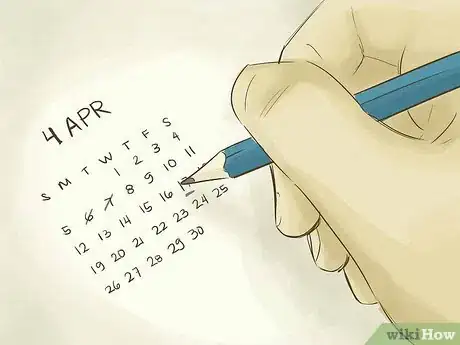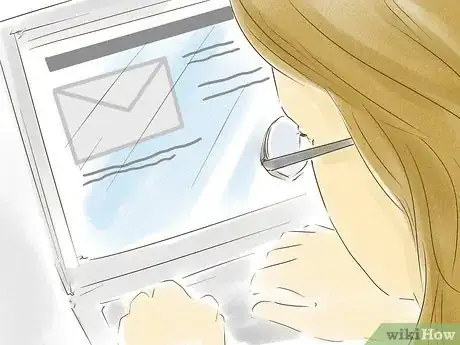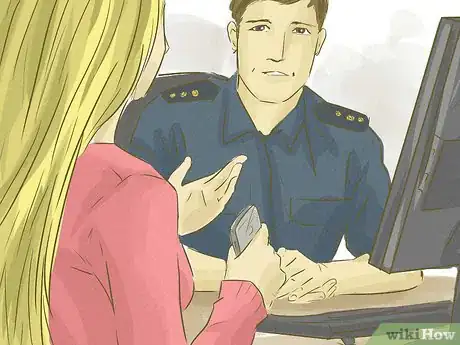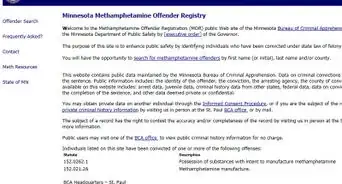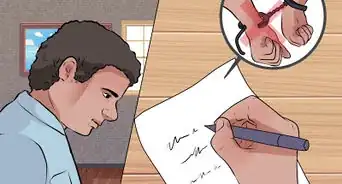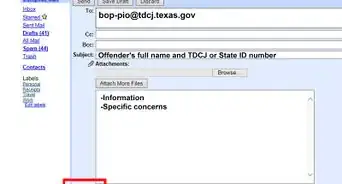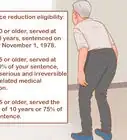This article was co-authored by Clinton M. Sandvick, JD, PhD. Clinton M. Sandvick worked as a civil litigator in California for over 7 years. He received his JD from the University of Wisconsin-Madison in 1998 and his PhD in American History from the University of Oregon in 2013.
This article has been viewed 59,691 times.
If you plead guilty to or were convicted of a crime, then you may have been sentenced to probation. Probation can be imposed in place of a jail sentence or after you are released from jail. As a probationer, you will face a host of requirements. One requirement is that you meet with a probation officer. Maintaining a cordial relationship with your probation officer is crucial to your ability to ultimately complete probation.
Steps
Preparing for Your Meeting
-
1Keep track of meeting dates. You should always know when you need to meet with your probation officer. The frequency of your meetings will depend on the supervision plan crafted by your officer. Some offenders meet weekly with their probation officer. Others meet less frequently.
- Sometimes you will meet in your home or at your worksite. In other situations, you may meet at the probation office.
- Regardless of when and where you meet, you should always keep track of the dates for every appointment. Buy a notebook and use it only for appointments. In the notebook, you should write down the dates of all meetings.
-
2Follow your probation conditions. It may sound obvious, but it bears repeating: you must follow all probation conditions imposed on you by the court. If you are ordered to remain drug-free, then don’t slip up. If you have to attend classes, make sure never to miss one. If the judge sentenced you to community service, complete all of your hours and do a good job.
- You make your probation officer’s life easier by following the rules. Furthermore, if you regularly perform your tasks on time, then your probation officer might cut you some slack if one time you need an extra day or two to do something.[1]
Advertisement -
3Dress appropriately. You should always look presentable when meeting with your probation officer. Wear the type of clothes you would wear to an interview for an office job. Men should wear dress pants and a collared shirt (tucked in). Women should wear slacks and a blouse or a dress.
- Let your probation officer know if you have to meet immediately after work. In this way, your probation officer will understand if you show up sweaty or slightly disheveled.
-
4Appreciate the stakes. You need to get along with your probation officer because he or she holds tremendous power over your future. For example, if you violate the conditions of your probation, then the officer must notify the court. Depending on the seriousness of the violation, the probation officer can request that the judge revoke probation.
- A probation officer can also help you if you want to shorten your probation. He or she will be allowed to testify at any hearing. Judges tend to give the probation officer’s opinion great weight. If you hope to end your probation early, then you will want to establish the best relationship you can with your probation officer.
Meeting with Your Probation Officer
-
1Understand why you have to meet. If a judge sentenced you to probation, then you will have to meet with your probation officer as part of your supervised release. The officer will come up with a supervision plan to help you meet the conditions of your probation and avoid any problems.
- Sometimes criminal defendants also have to meet with a probation officer so that the officer can create a pre-sentence report. The officer will ask you to describe what happened, your prior criminal history, whether you ever failed to appear in court, your family history, and your employment situation. The judge will then use this report to help come up with an appropriate sentence.
- Regardless of why you have to meet with a probation officer, the advice is the same.
-
2Arrive early. You should always be prompt to any meeting. If for any reason you are running late, then call or email your probation officer so that he or she knows.
-
3Sit properly. When talking to a probation officer, you want to speak clearly so that you are not misunderstood. The way you sit impacts how you talk. Try to sit up straight, with good posture. If you tilt your chin up slightly, your voice will sound clearer.[2]
- Always remember to breathe. The probation officer may ask you uncomfortable questions about topics you would rather not discuss. Be sure to breathe from your abdomen and not your chest. If you breathe from your chest, you will sound weak and lacking in confidence.[3]
-
4Be honest. You should never lie to your probation officer. You also should not make excuses for your conduct. If the probation officer asks you about your family history or the crime, be honest but don’t embellish.
- You need to maintain trust with your probation officer. Many probation officers have met with a lot of offenders and have developed a sense of when someone is being untruthful. You always want the probation officer to believe you.
-
5Stay upbeat. Your probation officer is a person, too. He or she has stresses from work or family life. Some days, your probation officer may be in a terrible mood. It is best to remain positive and enthusiastic.[4]
-
6Look the officer in the eye. By making eye contact, you can project confidence. Eye contact also signals that you are listening attentively to what the probation officer is saying.[5]
- You don’t have to stare. In fact, if you sense the officer is getting uncomfortable, then you should break the eye contact for a couple of seconds. However, you should make it a goal to establish eye contact repeatedly throughout the conversation.
- By making eye contact, you also avoid getting distracted. This technique is especially helpful if you meet your probation officer in a public setting, like a coffee shop.[6]
-
7Document conversations. As best as you can, you should get documentation of each conversation you have with your probation officer. Sometimes this is easy, especially if you can communicate by email. However, if you talk on the phone or in person, then follow up the call with an email summary of your conversation.[7]
- It is important to document conversations in case something goes wrong. If the probation officer tells you inaccurate information which you rely on, then he or she might deny telling you the information at a later date. Only by documenting your conversations can you protect yourself.[8]
-
8Avoid showing anger. Sometimes, people get probation officers who push their buttons. The officer could act this way intentionally or unintentionally, but it is vital that you not show anger. Always bite your tongue and smile.[9]
- If you feel that the probation officer is behaving unfairly and unprofessionally toward you, then you should document the incidents. Write down what the officer says and how he or she acts. Contact your criminal defense attorney to talk about what you can do.
Maintaining a Good Relationship
-
1Return calls and emails promptly. Always keep in touch with your probation officer and don’t force him or her to have to hunt around to find you. If you cannot immediately reach the officer, then be persistent. It is your responsibility to check in.
-
2Inform the officer when you move. If you get a new address, phone number, or email address, then your probation officer should be the first person you tell.[10]
- Also inform the officer if your job changes. Provide contact information for new the job as soon as possible.
- Since the officer may make “collateral contacts” with your family or friends, then you should update the officer on any changes in your personal life. If you’re getting divorced, tell your officer.
-
3Ask the probation officer for advice. If at any point you are struggling with something in your life, you should ask your probation officer what he or she thinks. Your probation officer might be a good resource for advice on how to get a new job or find a new place to live.
- By asking your probation officer for advice, you show that you trust him or her as well. You also signal that you are open to the officer’s opinion.
-
4Do not commit additional crimes. In addition to staying drug-free or performing community service (if required), you also need to stay crime-free. You should avoid getting arrested or receiving citations, including traffic tickets.
- You can be stopped by police for anything wrong with your car, even a blown taillight. Accordingly, you should make sure your registration, inspection, and insurance is all kept up to date in case you are pulled over.
- Your probation officer wants you to rehabilitate yourself and get off probation just as much as you do. Staying crime-free is a necessary part of that.
References
- ↑ http://blogs.findlaw.com/blotter/2012/12/how-to-get-along-with-your-probation-officer.html
- ↑ http://www.fastcompany.com/3035634/how-to-be-a-success-at-everything/6-simple-ways-to-improve-the-way-you-speak
- ↑ http://www.fastcompany.com/3035634/how-to-be-a-success-at-everything/6-simple-ways-to-improve-the-way-you-speak
- ↑ http://blogs.findlaw.com/blotter/2012/12/how-to-get-along-with-your-probation-officer.html
- ↑ http://www.littlethingsmatter.com/blog/2010/01/29/the-fundamentals-of-eye-contact/
- ↑ http://www.littlethingsmatter.com/blog/2010/01/29/the-fundamentals-of-eye-contact/
- ↑ http://blogs.findlaw.com/blotter/2012/12/how-to-get-along-with-your-probation-officer.html
- ↑ http://blogs.findlaw.com/blotter/2012/12/how-to-get-along-with-your-probation-officer.html
- ↑ http://koehlerlaw.net/2010/03/a-probation-officer-should-be-a-clients-best-friend/
